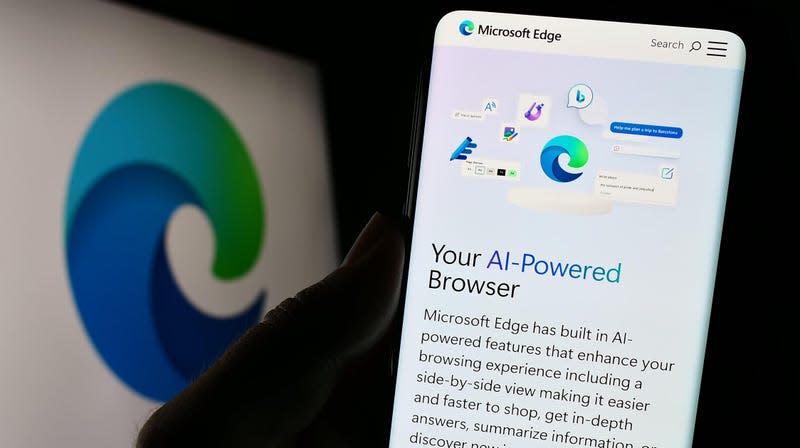Microsoft’s ‘AI Browser’ Edge Is a Precursor to the ‘AI’-ification of Everything

Microsoft is now calling Edge the “AI Browser” on mobile, though not on its Windows Store.
Microsoft is trying to rebrand its Edge internet browser. No longer should its name remind you that its icon shortcut sits alone and forgotten at the edge of your Windows desktop. Now Microsoft is trying to claim Edge is on the cutting edge of AI. The Redmond tech giant has started calling its native internet explorer “Microsoft Edge: AI Browser.” If you think that’s already a little on the nose, expect more companies to do so in the coming year.
The moniker appears when searching for Edge on Google Play Store and Apple’s App Store (though the “browser” is lowercase on Play Store, for some reason). Microsoft had already called it “your AI-powered browser” after adding Bing AI capabilities to it last year, but now the “AI” is right out front for people downloading the mobile app. The description for the app now talks up the browser’s GPT-4 capabilities with the built-in Copilot chatbot following on from Bing search. The browser also has access to OpenAI’s DALL-E 3 AI image generator model, accessible through the copilot. The Verge first noticed this name change. Microsoft updated the app store pages during the holiday break.
Read more
Consumer Reports Says These Are The Best Hybrid Cars For Less Than $35,000 In 2024
It’s time for ESPN to put an end to Pat McAfee’s Aaron Rodgers disaster
Wanna watch a smart woman totally body two stupid hockey men?
So you already have “E-” devices and “Smart-” tech, but the following big sea change this year will be the explicitly “AI-” branded devices. We have CES just around the corner, and already, we’re seeing devices that use modern deep learning algorithms put the “AI” up front. Take LG’s Signature OLED M4 and G4 TVs, the company just announced today. These TVs boast the “cutting-edge AI processor, “ claiming it helps enhance picture quality through AI-enhanced upscaling. We won’t see these in person for another week, so we don’t know if said processor results in a marginally better display, but that’s not really the point.
It’s only one more step before LG or other TV makers brand their devices “AI TVs.” Next week, we’ll see even more devices promoting AI upfront. We’ll likely see AI make its way inside refrigerators, vacuums, massage chairs, and many more obvious consumer devices. Google and Samsung are in a race to promote their smartphones as the “true AI phone.” Last year, Intel debuted its new mobile chip, all while trying to coin the term “AI PC.”
So don’t be too surprised this year if you read something on the new “AI e-bike” or the redubbed “AI toilet.” Eventually, the word will be as omnipresent as “smart” is now, as it becomes so universal that the term becomes entirely meaningless.
More from Gizmodo
Horror Game Studio Shuts Down Due To Cyberattacks, Poor Sales
Acura Sold 5 NSX Supercars In 2023, And There’s Still A Few Left For Sale
No One Knows What Happened To The Mercedes-Benz Truck Trapped In Chernobyl
Sign up for Gizmodo's Newsletter. For the latest news, Facebook, Twitter and Instagram.

